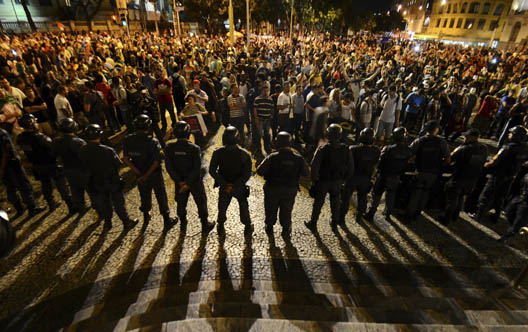 On March 20, the Atlantic Council’s Brent Scowcroft Center on International Security, in partnership with the US Advisory Commission on Public Diplomacy, hosted a roundtable focusing on the future of public diplomacy in the context of global trends. Titled Crafting Public Diplomacy for an Urbanized World, the roundtable examined how the US government, through public diplomacy, can address the issues that are arising from global urbanization. Representatives from the US Departments of State and Defense, the US Agency for International Development, other US government agencies, as well as experts from academia and the private and non-profit sectors participated.
On March 20, the Atlantic Council’s Brent Scowcroft Center on International Security, in partnership with the US Advisory Commission on Public Diplomacy, hosted a roundtable focusing on the future of public diplomacy in the context of global trends. Titled Crafting Public Diplomacy for an Urbanized World, the roundtable examined how the US government, through public diplomacy, can address the issues that are arising from global urbanization. Representatives from the US Departments of State and Defense, the US Agency for International Development, other US government agencies, as well as experts from academia and the private and non-profit sectors participated.
Urbanization’s massive scale, involving billions of human beings on every inhabited continent, is this century’s greatest demographic shift. Half the world’s population currently live in cities. By 2050, that figure will rise to seventy percent and by 2100 to eighty-five percent. Beyond the raw numbers, global urbanization facilitates economic exchange, technical innovation, and the emergence of more informed and engaged citizenries. Cities therefore facilitate the diffusion of power from state to non-state actors, providing a central diplomatic challenge for national governments. Cities also experience first-hand and up close a full range of global challenges ranging from climate change to food security, terrorism, energy security, and poverty. Cities, in short, are where the solutions to global challenges will be found or where these problems will be exacerbated.
Whether the US government is positioned to take advantage of global urbanization’s many opportunities and avoid its pitfalls was the event’s main question. Public diplomacy — which is about communicating with, informing, and influencing non-state actors abroad to serve policy goals – has some of the strategies and tools needed for this new world. But in order to deal with a highly fluid and unbounded reality on the ground, public diplomacy needs an overhaul.
Discussants identified several major shortcomings inside the US government’s public diplomacy efforts. The first was a whole-of-government critique: there is a lack of cross-agency public diplomacy coordination. The State Department engages in public diplomacy, of course, but other departments and agencies do so as well, whether they call it public diplomacy or something else. These efforts are rarely coordinated. Second, within the State Department, public diplomacy programs are separated from its policymaking apparatus, creating another coordination problem between policy and outreach. Third, the US government does not leverage strategically, meaning it does not systematically approach the question of how non-state actors’ influence abroad can be leveraged to facilitate US policy goals. Important non-state actors include regional bodies (e.g., the Organization of American States), sub-national governments (mayors, city governments), the private sector, NGOs, and individuals. A more spirited embrace of outreach partnerships would enable the US government to utilize ‘force multipliers’ in service of its ends. Finally, the US government does not embrace the suite of information and communication technologies (ICT) and geospatial technologies to conduct its public diplomacy. Using these technologies more effectively not only can improve messaging, they can help the government understand and navigate an increasingly complex world.
Roundtable attendees spent considerable time discussing risk and reward. On the one hand, they all agreed that the US government needs to respond to this new reality through empowering its diplomats on the ground, via decentralized messaging, outreach, and event response. However, a core obstacle is that the US government in general, and the State Department in particular, are risk averse. There are potentially serious diplomatic and political consequences when something goes awry through poorly coordinated messaging.
Image: Diplomacy's brave new world: Demonstrators gather during a protest as police officers stand guard in central Rio de Janeiro June 24, 2013. REUTERS/Lucas Landau

